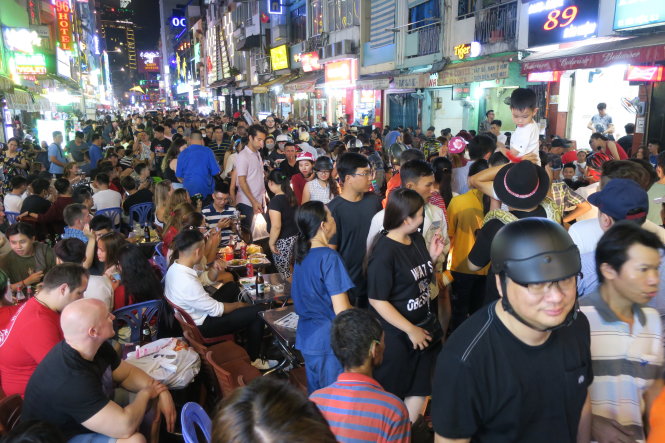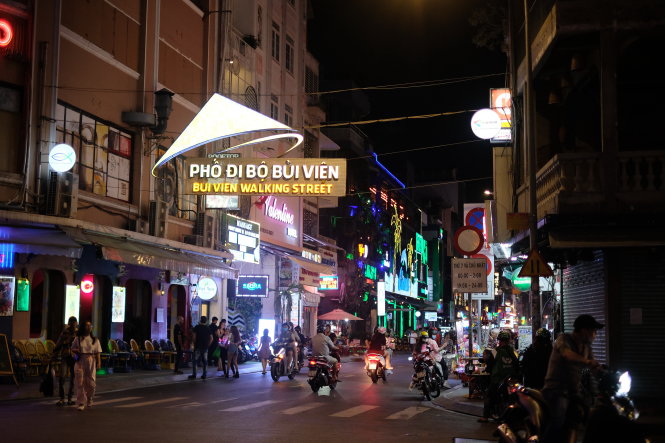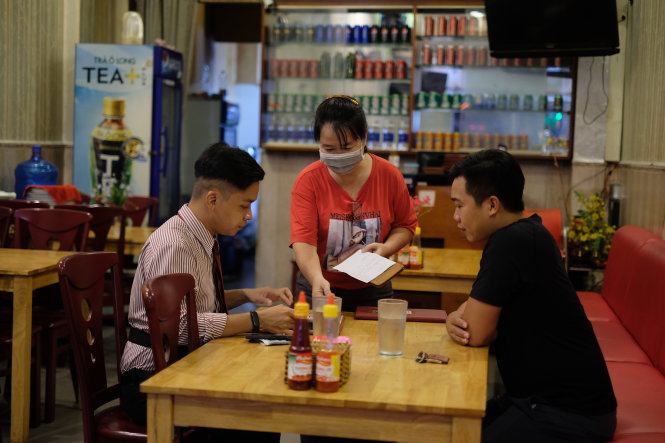It has taken a while for dining and entertainment businesses in the ‘backpacker area’ in downtown Ho Chi Minh City, which used to be teemed with commotion and activity prior to the two COVID-19 outbreaks, to adapt to a new normal and obtain pre-pandemic sales.
Bui Vien, located in District 1, and nearby streets including Pham Ngu Lao and De Tham make up the city’s most bustling nightlife area, which is also dubbed the ‘backpacker area’ due to its vibrant community of foreign travelers and expats.
Before the first novel coronavirus (COVID-19) outbreak hit the country in January, foreign tourists and expats used to fill diners, night clubs, pubs, and other facilities lining the streets for meals, snacks or drinks.
Shops, restaurants, and cafeterias offering local residents and tourists a wide variety of entertainment activities were packed with customers as well, while tourists and residents freely strolled along the roadways during pedestrian-only hours.
The scene has seen a stark contrast since regulations restricting social interaction were in place to stop the spread of COVID-19.
Businesses in the ‘backpacker area' are being dealt a hard blow after local authorities required shops, restaurants, and bars to suspend operations in March.
Most facilities that have remained open since the second outbreak in July are struggling to keep their business afloat.
Unprecedented emptiness
For most of a typical day, Taj Mahal, an Indian diner, still sat empty until later than 8:00 pm, when three customers stepped in for a late meal.
Despite coming few and far between, such an evening blessed with a handful of guests was considered by one of the diner owner’s acquaintances as a ‘sign of survival.’
“We normally pocketed VND14-15 million [US$602- 645] each night but revenue from two or three tables can now earn us only more than VND1 million [$43]. Most of the foreigners, who make up about 80 percent of our clientele, have returned to their home country,” Dang Thi Minh Phuong, who has run the diner for five years, lamented.
She added they had fared better during the first outbreak as many foreign tourists and expats were trapped in the country due to travel restrictions.
“As most foreigners finally got back to their home country as travel restrictions eased before the second wave hit the country, diners have been left void of customers and sales have reached rock bottom,” Phuong added.
Three of her five rooms rented out to foreigners also remained unoccupied.
Her attendants even had to pretend to be customers during their non-working hours so that the eatery would not look so deserted.
Phuong added though she did not shut down her business, sales have dropped a whopping 70 percent over the past several months, leaving her barely able to cover operating costs.
Phuong’s financial difficulties were mirrored by owners of many other dining and entertainment facilities lining the promenades.
“During the temporary business closures in March, tears brimmed in my eyes at the entire area being so deserted. No such thing has ever happened since I was born, grew up, and have done business here for more than 50 years,” Van Minh Thuy, another eatery operator in the quarter, shared.
Like many others, she has noticed a significant drop-off over the past months.
“I could hardly ride out the tough time even though I run the diner right in my own space and don’t worry about rent. Previously, hardly a day went by without me making no sale at all, but no-sale days are a new normal these months,” Thuy said sadly, adding she had raked in nearly VND20 million ($860) from the sale of beer each day in pre-pandemic times.
“Now we’ll be lucky if our revenue is 40 percent of that in pre-pandemic times,” she said.
Yolo, a restaurant and pub situated at one end of Bui Vien Street, did not fare any better.
Days since reopening after the restrictions imposed during the second outbreak were lifted, the place welcomed a mere 40-60 percent of their normal clientele.
High hopes for a post-pandemic rebound quickly dwindled as disappointing sales trickled in, for Yolo receives a limited number of visitors on weekends while remaining almost empty on weekdays.
Unable to pay operating costs, many shop owners have sold their space or mortgage it for bank loans.
According to Quang Hung, from the Kingdom recreation chain, their revenue sank to the lowest point while they had rents and staff salaries to worry about. Their nightclub and pub remained operational for only four months since early this year.
“We suffered the heaviest losses during the social distancing period in March, when all entertainment establishments were shuttered down. Our revenues have still seen a drop of 50 percent since reopening,” he revealed.
|
|
| Bui Vien Pedestrian Street, part of the ‘backpacker area’ in downtown Ho Chi Minh City is void of visitors as many foreigners have returned to their home country. Photo: Vu Thuy / Tuoi Tre |
Stepping up after shutdown
To survive the tough operating conditions, many businesses have resorted to temporary lay-offs and moved to heavily discount their products and services while rolling out a number of special offers.
Phuong, owner of Taj Mahal Restaurant, now found herself doing all kinds of chores around the diner after making three staff members redundant.
“We’re still lucky that more Vietnamese people have come to our diner during the pandemic,” she said.
A representative from Yolo said their efforts to ride out the crisis included laying off up to 70 percent of staff, mostly attendants, cutting the remaining staffers’ salaries by half, negotiating with landlords for a 30-percent rent discount, and cutting down on marketing and publicity activities.
The facility management have also made changes to their operational mechanism, menus, and opening hours. Instead of opening at 8:00 pm previously, Yolo is now open at 5:00 pm to usher in office workers who have just called it a day.
In the same efforts to make sales bounce back, Bollywood Restaurant and Nightclub, also on Bui Vien Street, has sold their food through five food delivery applications along with heavy discounts and attractive offers.
“We remained in operation for most of the pandemic as we moved our services online. Compared to pre-pandemic times when 80 percent of our clients were foreigners, our customers now are mostly Vietnamese,” Raj, the facility’s Indian operator, said, adding he did not lay off a single staff member during the tough times.
“We’re having our fingers crossed for a quick rebound thanks to Vietnam’s successful efforts to contain the second outbreak and resume flights to other countries,” the Indian national said, adding he has thrived on the empathy from many people around during this hard time, including his landlord who has offered discounts for five consecutive months.
While many shop owners have decided to give up business, Lu, 28, and a friend chose to inaugurate their eatery in the ‘backpacker area’ during the health crisis.
Their diner, Mr Hiu Food, located on De Tham Street, opened on the space previously home to a spa parlor which had closed during the crisis.
“We both had another day-time job which suffered from the pandemic, so we decided to open this diner,” Lu said, adding they have yet to rake in any revenue for the past few months.
|
|
| Customers in the ‘backpacker area’ in downtown Ho Chi Minh City are now mostly local people. Photo: Vu Thuy / Tuoi Tre |
Businesses dwindle by half
According to economic management officials from the People’s Committee of Pham Ngu Lao Ward, District 1, which oversees the ‘backpacker area,’ a total of 350 businesses operated on Bui Vien Street alone prior to the outbreaks.
The number has plummeted to 100-200 facilities following the second wave of infections, with most recording rock-bottom revenues. Many businesses’ sales have even plunged up to 75 percent.
The local administration is working to connect the businesses in need with banks for the government’s incentive loan package intended for post-pandemic recovery.
Vietnam has confirmed 1,096 coronavirus patients since January 23, when the virus first hit the country, according to the Ministry of Health's statistics.
It has recorded 35 virus-related deaths so far, most having suffered critical underlying health problems. The number of recovered patients has reached 1,020.
Like us on Facebook or follow us on Twitter to get the latest news about Vietnam!





















































